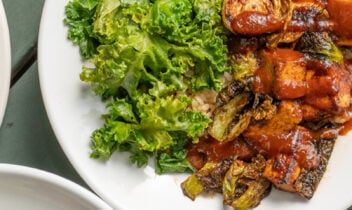About The Buzz: Frying Veggies is Healthier than Boiling?
WHAT THEY’RE SAYING
Frying vegetables in extra virgin olive oil improves the antioxidant profile of vegetables.
WHAT WE KNOW
Boiling is a common method for preparing vegetables. However, this practice may reduce the nutrient content of vegetables as water-soluble nutrients may leach out of the vegetables and into the water that is then discarded. Instead, frying or sautéing vegetables may be a better option. One class of water soluble nutrients is phenols, which are present in olive oil and certain types of vegetables. Phenols are antioxidants, functioning to counteract the damaging effects of free radicals that can lead to cell damage and increase the risk for developing chronic diseases.1 Preparing vegetables with olive oil instead of boiling them in water may help to maintain, or even improve, the antioxidant profile of the vegetables.
HOW DO WE KNOW THIS?
Researchers in Spain recently determined how different cooking techniques influence the phenolic composition of various vegetables.2 Potato, tomato, eggplant, and pumpkin (vegetables consumed regularly in the region) were boiled in water alone or prepared with olive oil by deep frying, sautéing, or boiling with a water/olive oil mixture. The researchers evaluated the fat and phenolic content of the vegetables, as well as the antioxidant capacity (the ability to neutralize free radicals) in the vegetable’s raw state and after each preparation technique. Unsurprisingly, boiling with the water/olive oil combination, sautéing, and deep frying all incrementally increased the fat content of the vegetables. However, only deep frying and sautéing increased the phenolic content of the vegetables compared to their raw forms, whereas boiling in water or in water with olive oil caused a reduction in phenols, indicating that the phenols were leached into the water. Interestingly, all cooking methods either maintained or improved the antioxidant capacity of the vegetables.
OUR ADVICE
This study demonstrates that cooking technique will result in differing nutrient profiles of vegetables. While deep frying in extra virgin olive oil significantly increases the phenolic content and antioxidant profile of vegetables compared with any other cooking method, the technique will also greatly increase the caloric content of the vegetables. Instead, sautéing vegetables may be the best option as it will increase the amount of phenols and antioxidant capacity of the vegetables without adding too many calories.
With the weather warming up, try making foil packets with your favorite vegetables, drizzled with olive oil, seasoned with salt and pepper and grilled for a delicious side. But don’t avoid boiled vegetables either! Boiling your vegetables is still fine (especially if you add a little bit of olive oil), especially if you consume the water too, such as in soups. Try our Mediterranean Potato Soup for a healthy, easy weeknight meal.
Video Center: Selection. Storage. Preparation.
How Many Cups Do You Need?
Key Nutrients in Fruits & Vegetables
Fruit & Veggie Database


